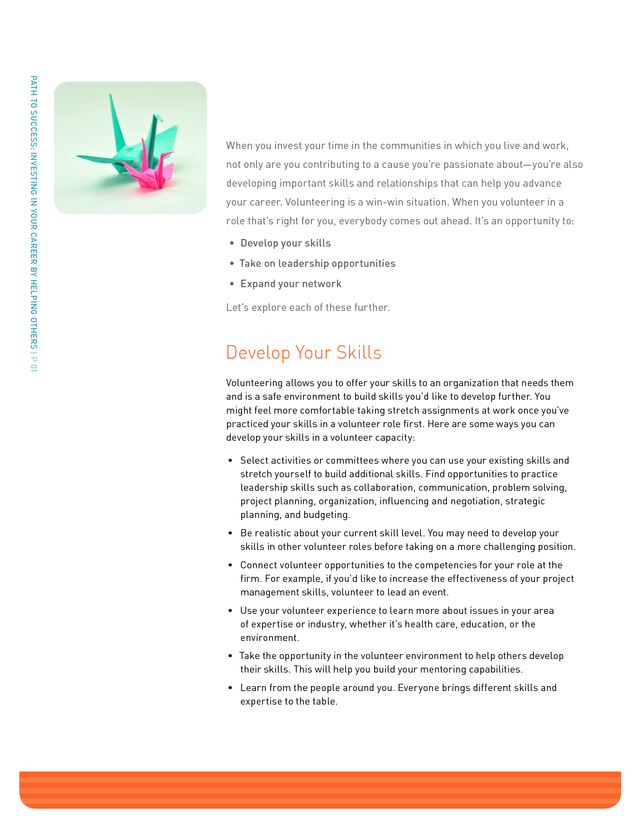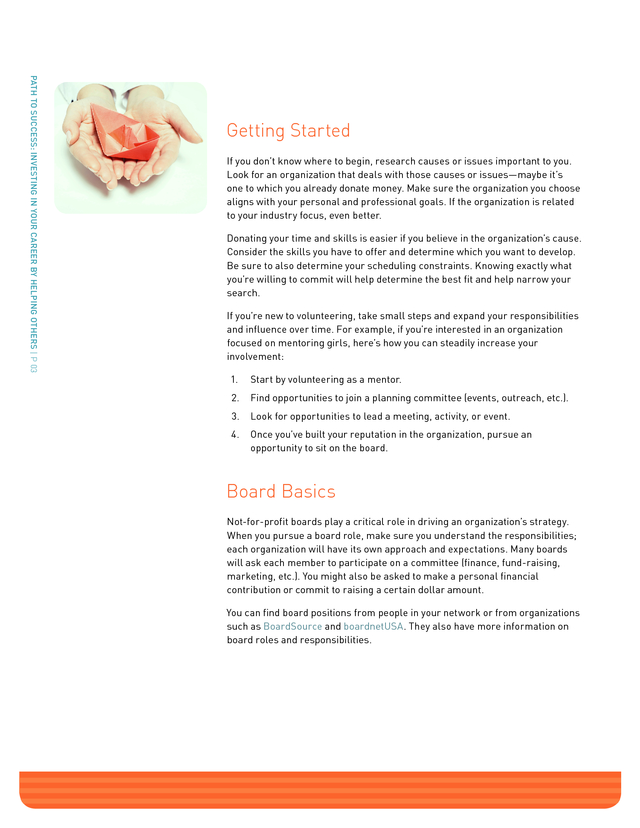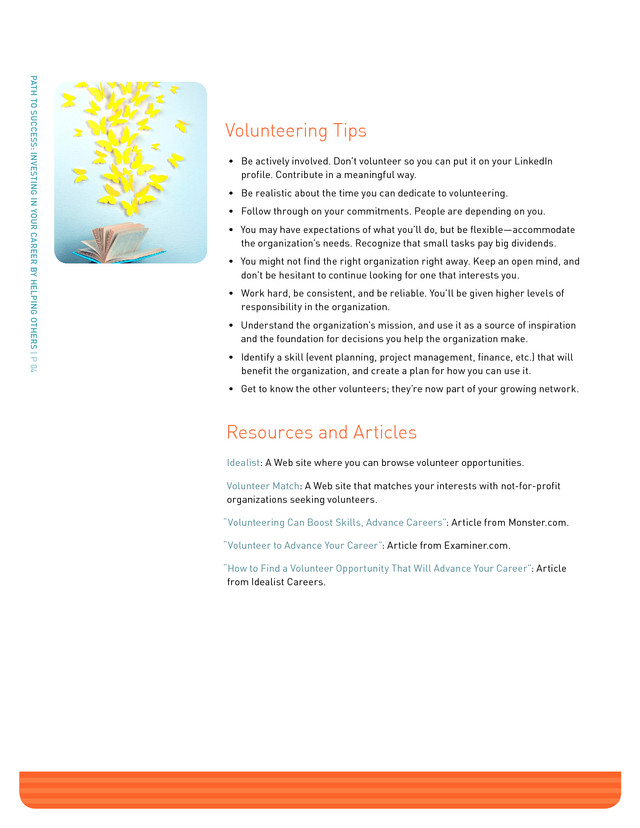Description
Path to Success
Investing in Your Career by Helping Others
Certified Public Accountants | Business Consultants
Go Further. Faster.
. PATH TO SUCCESS: INVESTING IN YOUR CAREER BY HELPING OTHERS | P 01
When you invest your time in the communities in which you live and work,
not only are you contributing to a cause you’re passionate about—you’re also
developing important skills and relationships that can help you advance
your career. Volunteering is a win-win situation. When you volunteer in a
role that’s right for you, everybody comes out ahead. It’s an opportunity to:
• Develop your skills
• Take on leadership opportunities
• Expand your network
Let’s explore each of these further.
Develop Your Skills
Volunteering allows you to offer your skills to an organization that needs them
and is a safe environment to build skills you’d like to develop further.
You might feel more comfortable taking stretch assignments at work once you’ve practiced your skills in a volunteer role first. Here are some ways you can develop your skills in a volunteer capacity: • Select activities or committees where you can use your existing skills and stretch yourself to build additional skills. Find opportunities to practice leadership skills such as collaboration, communication, problem solving, project planning, organization, influencing and negotiation, strategic planning, and budgeting. • Be realistic about your current skill level.
You may need to develop your skills in other volunteer roles before taking on a more challenging position. • Connect volunteer opportunities to the competencies for your role at the firm. For example, if you’d like to increase the effectiveness of your project management skills, volunteer to lead an event. • Use your volunteer experience to learn more about issues in your area of expertise or industry, whether it’s health care, education, or the environment. • Take the opportunity in the volunteer environment to help others develop their skills. This will help you build your mentoring capabilities. • Learn from the people around you.
Everyone brings different skills and expertise to the table. . PATH TO SUCCESS: INVESTING IN YOUR CAREER BY HELPING OTHERS | P 02 Take On Leadership Opportunities Accelerate the development of your leadership skills by participating in strategic projects and leading activities or committees. You gain valuable experience by being accountable to the community your organization serves. Leadership opportunities can expose you to scenarios that test your ability to lead under tough circumstances with limited resources. You’ll also gain new perspectives and cross-cultural understanding by engaging with people from diverse backgrounds. Here are two avenues to explore to build your leadership skills: • Take the opportunity to lead and make an impact.
Organize a volunteer activity, chair a committee, or serve on the board. Your enthusiasm, commitment, and results will be noticed. • Use the experience of being a board member to develop a deeper understanding of what it takes to run an organization. Think of it as being on the board of a corporation.
This is an opportunity for you to provide insight on the organization’s potential and how to achieve it. Expand Your External Network Networking is all about building relationships with the people you know and the people they know. Through volunteering, you’ll have an instant connection with other business professionals who share the same passion—in this way volunteering creates a continuously growing network. It’s an opportunity to interact and build meaningful relationships with individuals working in a variety of occupations and industries and from companies in your marketplace. You’ll find that many leaders in your community or profession serve on not-for-profit boards. Here are a couple of activities to consider to help you expand your network: • Keep a list of—and keep in touch with—the contacts you make, whether they’re staff, board members, or other volunteers.
Stay connected through LinkedIn. You’ll never know who might help you and how. • Be open to meeting new people, and have your elevator pitch ready to describe who you are and your role with the firm. You could be meeting a potential client or referral source. .
PATH TO SUCCESS: INVESTING IN YOUR CAREER BY HELPING OTHERS | P 03 Getting Started If you don’t know where to begin, research causes or issues important to you. Look for an organization that deals with those causes or issues—maybe it’s one to which you already donate money. Make sure the organization you choose aligns with your personal and professional goals. If the organization is related to your industry focus, even better. Donating your time and skills is easier if you believe in the organization’s cause. Consider the skills you have to offer and determine which you want to develop. Be sure to also determine your scheduling constraints. Knowing exactly what you’re willing to commit will help determine the best fit and help narrow your search. If you’re new to volunteering, take small steps and expand your responsibilities and influence over time.
For example, if you’re interested in an organization focused on mentoring girls, here’s how you can steadily increase your involvement: 1. Start by volunteering as a mentor. 2. Find opportunities to join a planning committee (events, outreach, etc.). 3. Look for opportunities to lead a meeting, activity, or event. 4. Once you’ve built your reputation in the organization, pursue an opportunity to sit on the board. Board Basics Not-for-profit boards play a critical role in driving an organization’s strategy. When you pursue a board role, make sure you understand the responsibilities; each organization will have its own approach and expectations. Many boards will ask each member to participate on a committee (finance, fund-raising, marketing, etc.). You might also be asked to make a personal financial contribution or commit to raising a certain dollar amount. You can find board positions from people in your network or from organizations such as BoardSource and boardnetUSA.
They also have more information on board roles and responsibilities. . PATH TO SUCCESS: INVESTING IN YOUR CAREER BY HELPING OTHERS | P 04 Volunteering Tips • Be actively involved. Don’t volunteer so you can put it on your LinkedIn profile. Contribute in a meaningful way. • Be realistic about the time you can dedicate to volunteering. • Follow through on your commitments. People are depending on you. • You may have expectations of what you’ll do, but be flexible—accommodate the organization’s needs.
Recognize that small tasks pay big dividends. • You might not find the right organization right away. Keep an open mind, and don’t be hesitant to continue looking for one that interests you. • Work hard, be consistent, and be reliable. You’ll be given higher levels of responsibility in the organization. • Understand the organization’s mission, and use it as a source of inspiration and the foundation for decisions you help the organization make. • Identify a skill (event planning, project management, finance, etc.) that will benefit the organization, and create a plan for how you can use it. • Get to know the other volunteers; they’re now part of your growing network. Resources and Articles Idealist: A Web site where you can browse volunteer opportunities. Volunteer Match: A Web site that matches your interests with not-for-profit organizations seeking volunteers. “Volunteering Can Boost Skills, Advance Careers”: Article from Monster.com. “Volunteer to Advance Your Career”: Article from Examiner.com. “How to Find a Volunteer Opportunity That Will Advance Your Career”: Article from Idealist Careers. .
You might feel more comfortable taking stretch assignments at work once you’ve practiced your skills in a volunteer role first. Here are some ways you can develop your skills in a volunteer capacity: • Select activities or committees where you can use your existing skills and stretch yourself to build additional skills. Find opportunities to practice leadership skills such as collaboration, communication, problem solving, project planning, organization, influencing and negotiation, strategic planning, and budgeting. • Be realistic about your current skill level.
You may need to develop your skills in other volunteer roles before taking on a more challenging position. • Connect volunteer opportunities to the competencies for your role at the firm. For example, if you’d like to increase the effectiveness of your project management skills, volunteer to lead an event. • Use your volunteer experience to learn more about issues in your area of expertise or industry, whether it’s health care, education, or the environment. • Take the opportunity in the volunteer environment to help others develop their skills. This will help you build your mentoring capabilities. • Learn from the people around you.
Everyone brings different skills and expertise to the table. . PATH TO SUCCESS: INVESTING IN YOUR CAREER BY HELPING OTHERS | P 02 Take On Leadership Opportunities Accelerate the development of your leadership skills by participating in strategic projects and leading activities or committees. You gain valuable experience by being accountable to the community your organization serves. Leadership opportunities can expose you to scenarios that test your ability to lead under tough circumstances with limited resources. You’ll also gain new perspectives and cross-cultural understanding by engaging with people from diverse backgrounds. Here are two avenues to explore to build your leadership skills: • Take the opportunity to lead and make an impact.
Organize a volunteer activity, chair a committee, or serve on the board. Your enthusiasm, commitment, and results will be noticed. • Use the experience of being a board member to develop a deeper understanding of what it takes to run an organization. Think of it as being on the board of a corporation.
This is an opportunity for you to provide insight on the organization’s potential and how to achieve it. Expand Your External Network Networking is all about building relationships with the people you know and the people they know. Through volunteering, you’ll have an instant connection with other business professionals who share the same passion—in this way volunteering creates a continuously growing network. It’s an opportunity to interact and build meaningful relationships with individuals working in a variety of occupations and industries and from companies in your marketplace. You’ll find that many leaders in your community or profession serve on not-for-profit boards. Here are a couple of activities to consider to help you expand your network: • Keep a list of—and keep in touch with—the contacts you make, whether they’re staff, board members, or other volunteers.
Stay connected through LinkedIn. You’ll never know who might help you and how. • Be open to meeting new people, and have your elevator pitch ready to describe who you are and your role with the firm. You could be meeting a potential client or referral source. .
PATH TO SUCCESS: INVESTING IN YOUR CAREER BY HELPING OTHERS | P 03 Getting Started If you don’t know where to begin, research causes or issues important to you. Look for an organization that deals with those causes or issues—maybe it’s one to which you already donate money. Make sure the organization you choose aligns with your personal and professional goals. If the organization is related to your industry focus, even better. Donating your time and skills is easier if you believe in the organization’s cause. Consider the skills you have to offer and determine which you want to develop. Be sure to also determine your scheduling constraints. Knowing exactly what you’re willing to commit will help determine the best fit and help narrow your search. If you’re new to volunteering, take small steps and expand your responsibilities and influence over time.
For example, if you’re interested in an organization focused on mentoring girls, here’s how you can steadily increase your involvement: 1. Start by volunteering as a mentor. 2. Find opportunities to join a planning committee (events, outreach, etc.). 3. Look for opportunities to lead a meeting, activity, or event. 4. Once you’ve built your reputation in the organization, pursue an opportunity to sit on the board. Board Basics Not-for-profit boards play a critical role in driving an organization’s strategy. When you pursue a board role, make sure you understand the responsibilities; each organization will have its own approach and expectations. Many boards will ask each member to participate on a committee (finance, fund-raising, marketing, etc.). You might also be asked to make a personal financial contribution or commit to raising a certain dollar amount. You can find board positions from people in your network or from organizations such as BoardSource and boardnetUSA.
They also have more information on board roles and responsibilities. . PATH TO SUCCESS: INVESTING IN YOUR CAREER BY HELPING OTHERS | P 04 Volunteering Tips • Be actively involved. Don’t volunteer so you can put it on your LinkedIn profile. Contribute in a meaningful way. • Be realistic about the time you can dedicate to volunteering. • Follow through on your commitments. People are depending on you. • You may have expectations of what you’ll do, but be flexible—accommodate the organization’s needs.
Recognize that small tasks pay big dividends. • You might not find the right organization right away. Keep an open mind, and don’t be hesitant to continue looking for one that interests you. • Work hard, be consistent, and be reliable. You’ll be given higher levels of responsibility in the organization. • Understand the organization’s mission, and use it as a source of inspiration and the foundation for decisions you help the organization make. • Identify a skill (event planning, project management, finance, etc.) that will benefit the organization, and create a plan for how you can use it. • Get to know the other volunteers; they’re now part of your growing network. Resources and Articles Idealist: A Web site where you can browse volunteer opportunities. Volunteer Match: A Web site that matches your interests with not-for-profit organizations seeking volunteers. “Volunteering Can Boost Skills, Advance Careers”: Article from Monster.com. “Volunteer to Advance Your Career”: Article from Examiner.com. “How to Find a Volunteer Opportunity That Will Advance Your Career”: Article from Idealist Careers. .



















